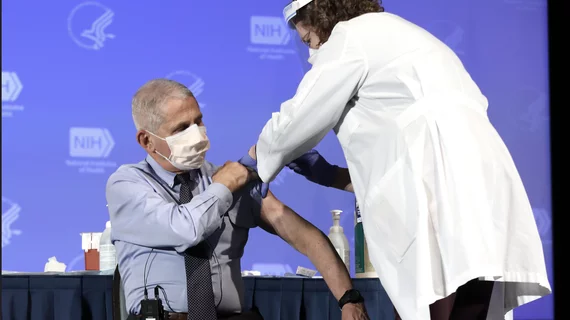Cardiologist says COVID-19 vaccinations ‘must stop’ due to the risk of adverse events—scientists and doctors push back
Aseem Malhotra, MBChB, a prominent London-based cardiologist and author, has gained considerable attention after detailing his changing thoughts on the legitimacy and necessity of COVID-19 vaccines. Malhotra wrote two editorials about his changing perspective in the Journal of Insulin Resistance, where he works as an editor.[1,2] He has also been discussing his stance with the media, appearing in a press conference hosted by the World Council for Health and regularly discussing the topic in interviews and on social media.
Malhotra was once a vocal supporter of COVID-19 vaccines, even appearing on television to promote the benefits of vaccination. Now, however, he is questioning if COVID-19 vaccines have done more harm than good for the general public and asking that they stop being administered altogether.
“There is a strong scientific, ethical and moral case to be made that the current COVID vaccine administration must stop until all the raw data has been subjected to fully independent scrutiny,” Malhotra said in his second of two editorials. “Looking to the future the medical and public health professions must recognize these failings and eschew the tainted dollar of the medical-industrial complex. It will take a lot of time and effort to rebuild trust in these institutions, but the health—of both humanity and the medical profession—depends on it."
Why the change of heart on COVID vaccines?
Malhotra wrote that he happily received both doses of a COVID-19 vaccine in early 2021. In fact, he said, he was “surprised and concerned” at the time about the number of “vaccine-hesitant patients” he encountered on a regular basis.
When his father tragically died after suffering a cardiac arrest in July 2021, however, he says he started to reconsider his perspective. Malhotra’s father, Prof. Kailash Chand, OBE, was a celebrated figure throughout England and beyond—and, yes, he was vaccinated. His death confused Malhotra, both because his father had been taking great care of his body and because “there was no evidence of an actual heart attack.” Malhotra ultimately concluded that there is a “real possibility” the COVID-19 vaccines had played a significant role.
Malhotra explained that this is when he started thinking more and more about the vaccines. After reviewing the data in great detail in his editorials, he shared his conclusion that the numbers suggest there is “a greater risk of serious adverse events from the vaccines than being hospitalized from COVID-19.”
“Pharmacovigilance systems and real-world safety data, coupled with plausible mechanisms of harm, are deeply concerning, especially in relation to cardiovascular safety,” he added.
Scientists and doctors respond to claims the COVID vaccine causes more harm than good
The medical and scientific communities have responded to these editorials rather quickly. Both columns were repeatedly shared once they went live, and groups agreeing with Malhotra and disagreeing with Malhotra have both been quite active.
Health Feedback, a group focused on “sorting fact from fiction in health and medical media coverage,” provided a thorough rebuttal of the editorials on its website.
“Scientific evidence from clinical trials and safety monitoring indicate that the COVID-19 vaccines are safe and effective,” the group wrote. “While severe reactions to the vaccine can occur, they are rare, and the most common side effects of vaccination are mild and go away within a few days. All available evidence indicates that being vaccinated is safer than not being vaccinated.”
The Health Feedback response highlighted the fact that multiple organizations supporting Malhotra have been associated with spreading COVID-19 misinformation in the past. This includes the World Council for Health, the host of the previously mentioned press conference, and Health Advisory and Recovery Team.
A recent blog post from Science-Based Medicine, a website owned and operated by the New England Skeptical Society, focused on the second of Malhotra’s two editorials. David Gorski, MD, PhD, a professor with Wayne State University, wrote the blog post, describing it as “projection, pure and simple.”
“He’s accusing conventional medical authorities, big pharma, and social media companies of spreading medical misinformation about COVID-19 vaccines by using the very techniques of misinformation that he claims to decry, such as cherry-picked studies and conspiracy theories, to do it," Gorski wrote.
Gorski also shared his doubts about the validity of the Journal of Insulin Resistance, saying the publication does not appear to publish many articles—and when it does, it appears to primarily publish the thoughts of its own editors. Both of these facts, he said, “raise red flags for this being an ideology journal disguised as a medical journal.”
Many have also fully agreed with Malhotra, sharing his story and commenting on it online. The Epoch Times and other outlets already known for being vocal against COVID-19 vaccines, for example, have highlighted the importance of his story. Also, one quick video of Malhotra from Sept. 27 has already hit 1.1 million views on Twitter.
Cardiovascular Business also reached out to both the American College of Cardiology (ACC) and European Society of Cardiology (ESC) about the content of Malhotra’s editorials. The ACC has repeatedly supported COVID-19 vaccines, emphasizing that the small risks of these vaccines are not nearly as severe as the risks of a COVID-19 infection.
Instead of a full comment, the ACC highlighted its previous publications on this topic, specifically a 2022 document from its Solution Set Oversight Committee.[3] The ESC has not yet responded.

